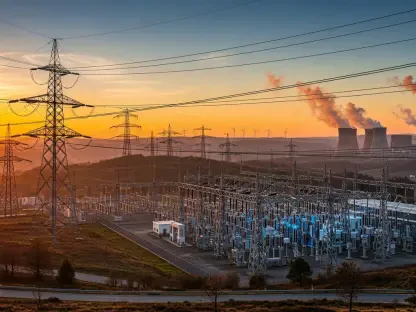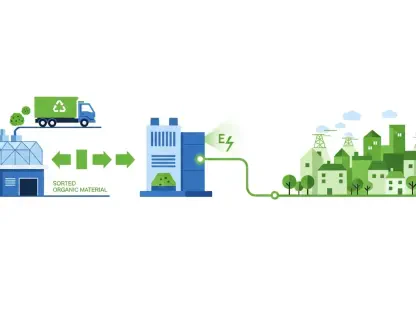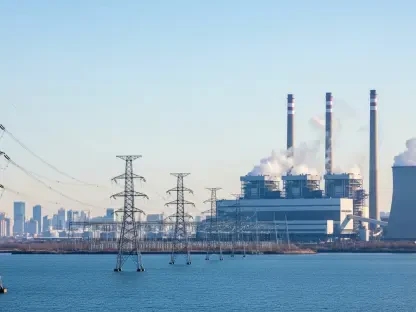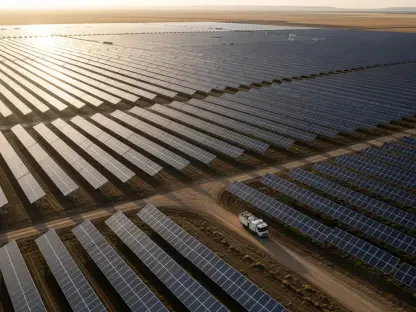What if a single corporate move could tilt the balance toward a cleaner, greener planet? Picture vast industrial landscapes powered not by fossil fuels, but by renewable energy derived from organic waste. This vision is inching closer to reality as Mitsubishi Corporation, a global titan, dives into the biogas market through a strategic investment in KIS Group’s Indonesia operations. This partnership isn’t just a financial deal—it’s a potential game-changer in the race against climate change, promising to reshape how industries source energy. Let’s explore the depths of this collaboration and its ripple effects on sustainability.
Why This Partnership Packs a Punch
The significance of Mitsubishi’s entry into biogas cannot be overstated. As the world scrambles to cut carbon emissions—evidenced by a 2024 report from the International Energy Agency showing renewable energy adoption rising by 30% in key markets—this alliance signals a major shift. Mitsubishi, with its sprawling network across over 90 countries, is partnering with KIS Group, a seasoned player in renewable gas since its founding in 2006. Together, they aim to tackle the pressing need for low-carbon alternatives, positioning themselves at the forefront of an industry projected to grow to $61 billion globally by 2030. This isn’t just about business growth; it’s about addressing a critical environmental challenge head-on.
The stakes are high in today’s energy landscape. With climate policies tightening and corporations facing pressure to meet sustainability targets, biogas offers a practical solution by converting waste into fuel. This partnership stands as a beacon of what’s possible when global reach meets specialized innovation, potentially influencing how other conglomerates approach renewable investments. The focus on actionable outcomes over mere promises sets this collaboration apart as a model for real impact.
The Powerhouse Duo: Mitsubishi and KIS Group Unite
At the heart of this venture lies a synergy of strengths. Mitsubishi brings its unparalleled logistics and trading capabilities to the table, enhancing supply chain efficiencies for KIS Group’s operations in Indonesia. In return, KIS Group offers Mitsubishi access to cutting-edge biomethane technology and a proven track record, underscored by long-term contracts with industry giants like Unilever and Shell. Their combined expertise targets diverse sectors, from palm oil to dairy, aiming to deliver cleaner energy solutions that reduce reliance on traditional fuels.
The scope of their ambition is striking. Plans are in motion to develop advanced biogas products, including BioCNG and BioLNG, which can power transportation and industrial processes with a minimal environmental footprint. This isn’t a small-scale experiment; it’s a calculated effort to redefine energy norms in regions hungry for sustainable options. The melding of Mitsubishi’s global infrastructure with KIS Group’s technical prowess creates a formidable force poised to challenge outdated energy paradigms.
A Vision for Global Expansion
Geographic boundaries won’t limit this partnership’s aspirations. With Mitsubishi’s backing, KIS Group is setting its sights on penetrating markets in North America, South America, and Europe within the next five years, starting from 2025. This aggressive expansion strategy aligns with a broader goal to amplify renewable gas production on a worldwide scale. The numbers speak volumes: a planned $1 billion investment in projects across Southeast Asia and India by 2030 highlights the scale of their commitment to building sustainable energy infrastructure.
Beyond mere growth, this move addresses regional energy disparities. Southeast Asia, for instance, faces unique challenges with waste management and energy access, making biogas a dual-purpose solution. By tailoring projects to local needs—such as leveraging agricultural waste in rural areas—the partnership aims to create a blueprint for scalable impact. This isn’t just about entering new markets; it’s about transforming them with innovative, eco-friendly alternatives.
Voices Championing Change
Confidence in this alliance resonates from the top. KR Raghunath, Founder and CEO of KIS Group, described Mitsubishi’s investment as a powerful endorsement of their technology, stating, “This partnership will turbocharge our growth and extend our footprint in the global renewable energy arena.” Such enthusiasm isn’t isolated; industry analysts have noted that cross-border collaborations like this are essential for mainstreaming biogas as a viable energy source. The alignment of vision and resources fuels optimism about tangible outcomes.
The credibility of this endeavor is further bolstered by KIS Group’s existing partnerships with major corporations. Their ability to secure deals with entities like Toyota for biomethane supply demonstrates market trust that Mitsubishi can now amplify. This isn’t mere speculation—real-world applications of their technology are already in play, offering a glimpse into a future where renewable gas powers everyday operations across industries. The chorus of support underscores a shared belief in biogas as a cornerstone of sustainable progress.
Lessons for a Sustainable Tomorrow
This collaboration offers critical insights for stakeholders across the energy spectrum. Businesses looking to pivot toward renewables can learn from the strategic pairing of global networks with niche expertise, as exemplified here. Identifying partners with complementary strengths can accelerate innovation, much like Mitsubishi’s logistics enhance KIS Group’s operational reach. The emphasis on synergy over competition provides a roadmap for others to follow.
Scalability remains a key takeaway. Projects like BioCNG and BioLNG, adaptable to various regions and sectors, highlight the need for flexible solutions in tackling global energy demands. Moreover, long-term investment commitments—such as the $1 billion pledge over the coming years—demonstrate the importance of aligning financial strategies with sustainability goals. For policymakers and investors, supporting such initiatives can catalyze broader adoption of clean energy technologies, paving the way for systemic change.
Reflecting on this partnership, it becomes clear that strategic alliances can forge a path for tangible environmental progress. Looking back, the commitment to expansive goals and innovative solutions stands as a testament to what determined collaboration can achieve. Moving forward, the challenge shifts to maintaining momentum—ensuring that investments translate into widespread adoption of biogas solutions. Stakeholders are urged to prioritize policies and funding that support such initiatives, while industries need to embrace renewable alternatives with urgency. The journey has begun, but its success hinges on collective action to sustain the drive toward a cleaner, more resilient energy future.









